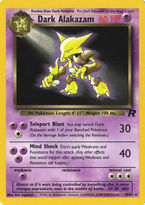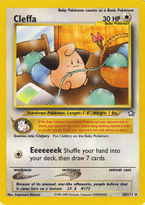Babyporter (TCG): Difference between revisions
mNo edit summary |
mNo edit summary |
||
| Line 1: | Line 1: | ||
{{ArchetypeInfobox | {{ArchetypeInfobox | ||
|title=Babyporter | |title=Babyporter | ||
|image= | |image=DarkAlakazamTeamRocket1.jpg | ||
|image2=CleffaNeoGenesis20.jpg | |image2=CleffaNeoGenesis20.jpg | ||
|caption={{TCG ID|Team Rocket|Dark Alakazam|1}} and {{TCG ID|Neo Genesis|Cleffa|20}} | |caption={{TCG ID|Team Rocket|Dark Alakazam|1}} and {{TCG ID|Neo Genesis|Cleffa|20}} | ||
Revision as of 12:42, 17 May 2012
| Babyporter | ||||||||||
|---|---|---|---|---|---|---|---|---|---|---|
| ||||||||||
Babyporter was a type of Pokémon Trading Card Game deck archetype consisting of early Baby Pokémon, a Pokémon with an attack that does damage and switches the attacking Pokémon with a benched Pokémon, and a Pokémon that prevents the opponent from playing Trainer cards. The combination of cards used most often to execute this strategy were Dark Alakazam, Cleffa, and Dark Vileplume. Donphan from the Neo Genesis expansion can also be used in place of, or in combination with, Dark Alakazam.
Cards
Key Cards
- Dark Alakazam is a main attacking Pokémon. Teleport Blast does fairly good damage, and gives a player the option to switch Dark Alakazam with one of their benched Pokémon.
- Dark Vileplume is the most crucial trainer-blocker in the deck because its Hay Fever Pokémon Power stops all Trainer cards from being played.
- Donphan's Rapid Spin attack does decent damage and forces both players to switch their active Pokémon.
- Cleffa is very important to the deck because it is the main support Pokémon used. Its Eeeeeeek attack allows a player to shuffle their hand into their deck and then draw 7 cards. Also, the fact that an opposing Pokémon needs to flip a coin in order to successfully attack Cleffa, and Cleffa's low retreat cost, mean that it can easily be taken out of harm's way.
- Pokémon Breeder allows a player to skip the middle evolution in a line. An good example is evolving Oddish into Dark Vileplume, skipping Dark Gloom. This is extremely helpful because the deck runs two three-stage evolution lines.
Other Pokémon
- Abra is only in the deck to evolve indirectly into Dark Alakazam, or directly via Pokémon Breeder.
- Dark Kadabra is the middle stage of the Dark Alakazam line, and is for use when the player does not have immediate access to a Pokémon Breeder
- Oddish is in the deck for the same reason as Abra, but for the Dark Vileplume instead.
- Dark Gloom is the middle stage of the Dark Vileplume, and is only useful for its evolution. Even then, it is usually more profitable and efficient to evolve by Pokémon Breeder.
- Elekid is the only damage-dealing Baby Pokémon in the deck. It has the same benefits as Cleffa, and its Playful Punch Pokémon Power can be used even while Elekid is on the bench.
- Phanpy is a Basic Pokémon with mediocre stats, so it is only for evolution purposes.
Other Trainers
- Professor Elm lets a player shuffle their hand into their deck, then draw 7 cards. However, they then cannot play any more trainer cards that turn. This is useful in that it allows a player to refresh their hand, and, if they have a small hand, increase their hand size. Although this seems to be a coincidence, Professor Elm has almost the exact same effect as Cleffa's attack.
- The Boss's Way searches out any two Dark Pokémon from a player's deck.
- Pokémon Trader swaps any Pokémon from a player's hand with any one from their deck, letting them choose which Pokémon they need most in their current situation.
- Bill is used only to gain card advantage, which is always important.
- Rocket's Hideout gives +20 HP to all Dark Pokémon in play.
- Chaos Gym greatly diminishes both players' chances of successfully playing a Trainer card.
Energy Cards
- Rainbow Energy provides any type of energy and can be used for Dark Alakazam, Dark Vileplume, or Donphan's attacks.
- Psychic Energy powers Dark Alakazam.
- Grass Energy powers Dark Vileplume.
- Fighting Energy powers Donphan.
Strategy
Most turns would consist of an attack, switching for a Baby Pokémon on the bench. The next turn, the player would retreat the Baby Pokémon for free and attack again, repeating the cycle as long as it took to defeat the opponent's deck. The deck made constant use of the original Baby Pokémon's rule that stated as long as that Pokémon was active the opponent would have to flip in order to successfully attack. The trainer-blocking Pokémon would then be used to keep the opponent from switching the Baby Pokémon out of the active position. As a result, the deck proved extremely frustrating to play against, particularly when Focus Band was attached to the Baby Pokémon.
Typical Decklist
The deck list appearing below is not official; it is meant to represent an average build of the archetype, not specifically constructed for any regional metagame. Being that this is merely an archetype, a player may wish to change any part of this deck when building his or her own version.
| Quantity | Card Name | Type | Rarity |
|---|---|---|---|
| 3x | Abra | ||
| 2x | Dark Kadabra | ||
| 3x | Dark Alakazam |  H H
| |
| 4x | Oddish | ||
| 3x | Dark Gloom | ||
| 4x | Dark Vileplume |  H H
| |
| 1x | Elekid | ||
| 2x | Phanpy | ||
| 2x | Donphan | ||
| 4x | Cleffa | ||
| 4x | Professor Elm | T | |
| 2x | Pokémon Breeder | T | |
| 2x | The Boss's Way | T | |
| 2x | Pokémon Trader | T | |
| 2x | Bill | T | |
| 3x | Rocket's Hideout | T | |
| 1x | Chaos Gym | T | |
| 4x | Rainbow Energy | E |  H H
|
| 6x | Psychic Energy | E | -- |
| 2x | Grass Energy | E | -- |
| 4x | Fighting Energy | E | -- |
Restriction
At the end of 2002, Slowking was removed from the Modified format (Dark Vileplume had already been removed earlier in the year), making it much easier to switch a player's active Pokémon. In addition, all of the cards were later rotated from Pokémon Organized Play because they were too old.

|
This article is part of Project TCG, a Bulbapedia project that aims to report on every aspect of the Pokémon Trading Card Game. |

